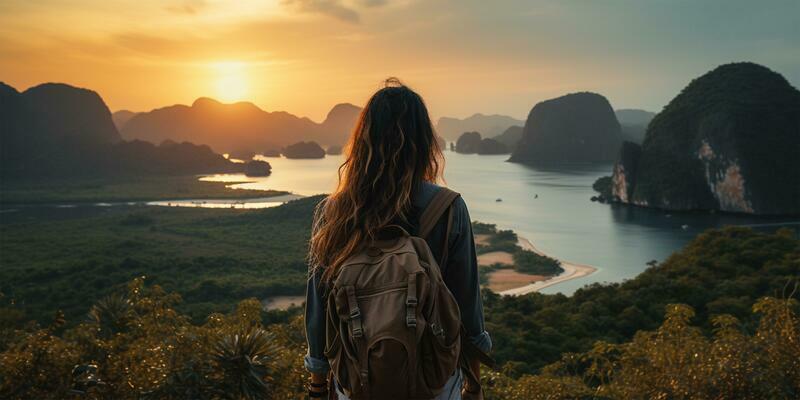Solo travel is one of the most empowering and transformative experiences you can embark on. It offers freedom, self-discovery, and the opportunity to fully immerse yourself in new cultures without the constraints of group decisions. However, with all the excitement of travelling solo comes the responsibility of staying safe, particularly since you’re relying solely on yourself for everything from navigation to protection. Whether you’re exploring a bustling city or hiking through remote mountains, keeping safety in mind is essential. Here’s a comprehensive guide on how to stay safe while traveling solo in 2024.
1. Research Your Destination Thoroughly
Before you even step on the plane, it’s important to do your homework. Researching your destination can help you understand cultural norms, identify safe areas, and avoid potential risks. This is especially important if you’re traveling to a country you’ve never been to before or one with vastly different customs and laws.
- Know the local customs: Understanding local customs can prevent you from unintentionally offending people or putting yourself in risky situations. In some countries, certain gestures, clothing choices, or behaviors may be considered inappropriate or dangerous.
- Stay updated on local news: Political situations, natural disasters, or outbreaks can change quickly. Check travel advisories issued by your government, and monitor local news channels to stay informed.
- Check crime rates: Knowing the safety reputation of your destination is crucial. Look for information on common scams, high-crime areas, and safety tips for tourists.
2. Choose Your Accommodation Wisely
Where you stay plays a major role in your safety while traveling solo. Always prioritize safety over budget when choosing accommodation, particularly if you’re in a location you’re unfamiliar with.
- Read reviews: Websites like Booking.com, Hostelworld, and Airbnb offer reviews from previous travelers. Pay attention to reviews that mention safety, location, and staff helpfulness.
- Consider location: Ideally, choose accommodation in well-populated areas with easy access to public transportation. Avoid staying in isolated neighborhoods, even if they offer cheaper options.
- Opt for women-only accommodations: Many hostels and hotels now offer female-only dorms or rooms, which can be a more secure option for solo female travelers.
3. Stay Connected
When traveling solo, staying connected to people back home can provide an extra layer of security. Make sure friends or family know your whereabouts, and keep them updated regularly.
- Share your itinerary: Before you leave, share a detailed itinerary with someone you trust. Include the names of your accommodations, flight numbers, and important contact details.
- Use technology: Apps like Google Maps, Find My Friends, or WhatsApp can be used to share your live location with trusted individuals. Many travel apps now include emergency contact features, which can be helpful in a crisis.
- Local SIM cards or portable Wi-Fi: Having access to the internet while abroad allows you to communicate easily, navigate with GPS, and find help in case of emergency. If buying a local SIM card isn’t an option, consider renting a portable Wi-Fi device.
4. Blend In With the Locals
Looking like a tourist can make you more susceptible to scams or theft. Blending in with the local culture helps you avoid unnecessary attention and stay safe.
- Dress appropriately: In certain countries, dressing modestly or adhering to local dress codes is not just respectful but also a safety measure. For example, in many conservative countries, revealing clothing can attract unwanted attention.
- Be aware of your surroundings: Solo travelers should always be vigilant. Avoid using loud or overly noticeable gadgets like large cameras in areas known for pickpocketing.
- Walk with confidence: Even if you’re lost, try not to look confused. Walk with purpose, and if you need directions, step into a shop or cafe to ask discreetly rather than standing on the street corner.
5. Keep Your Valuables Secure
Carrying too many valuables can make you a target for thieves. Minimize the number of valuables you carry and keep what you do bring secure.
- Use anti-theft gear: Invest in anti-theft bags, money belts, or hidden wallets to keep your passport, money, and cards safe. Bags with slash-resistant straps and lockable zippers can provide extra security in crowded areas.
- Divide your cash and cards: Never keep all your cash and cards in one place. If something happens, you won’t be left stranded without any access to money.
- Use a safe or locker: If your accommodation offers a safe, use it for valuables like your passport and electronics. In hostels, always use lockers to secure your belongings.
6. Trust Your Instincts
One of the most valuable tools a solo traveler has is their intuition. If something doesn’t feel right, trust your gut and remove yourself from the situation.
- Avoid risky areas at night: Most cities have areas that are perfectly safe during the day but become unsafe after dark. Know which areas to avoid, and always have a plan for how you’ll get back to your accommodation before nightfall.
- Don’t overshare: While it can be fun to make new friends, be careful about sharing too much personal information with strangers, especially details about your accommodation or travel plans.
- Know when to say no: Whether it’s declining an offer from someone you’ve just met or refusing to engage in activities that make you uncomfortable, don’t be afraid to assert your boundaries.
7. Stay Healthy
Maintaining your health is an important aspect of staying safe while traveling solo. It’s harder to deal with health issues when you’re alone, so taking preventative measures can help you avoid getting sick or injured during your trip.
- Pack a first-aid kit: Bring a small travel-sized first-aid kit that includes essentials like pain relievers, band-aids, antiseptic wipes, and any prescription medications you may need.
- Stay hydrated and eat well: Dehydration and poor nutrition can make you more susceptible to illness, so be mindful of your water and food intake.
- Health insurance: Make sure you have travel insurance that covers medical emergencies, especially if you’re heading to a country where healthcare costs are high or access is limited.
8. Be Prepared for Emergencies
While you hope nothing goes wrong on your solo adventure, it’s always better to be prepared for the unexpected.
- Know local emergency numbers: Every country has different emergency contact numbers for the police, ambulance, or fire services. Keep these numbers saved on your phone or written down somewhere accessible.
- Keep copies of important documents: Make photocopies or digital copies of your passport, visa, travel insurance, and any important documents. Keep these copies in a separate location from the originals.
- Have a backup plan: Always have a backup plan for transportation, accommodation, or money in case your primary arrangements fall through.
9. Trust Local Resources
When traveling solo, don’t be afraid to ask locals for advice. Hotel staff, tour guides, and even restaurant workers can often give you invaluable tips on where to go (or avoid) and how to navigate the area safely.
- Use official taxis or rideshare apps: In some destinations, unregulated taxi services can be unsafe. Stick to official taxi ranks or use trusted rideshare apps like Uber or Bolt.
- Join guided tours: If you want to explore off-the-beaten-path areas but feel nervous doing so alone, consider joining a guided tour. Group tours are not only a safer way to explore but also a great way to meet fellow travelers.
Conclusion
Travelling solo is a thrilling and liberating experience. Still, it also requires careful planning and awareness to ensure your safety. By researching your destination, staying connected, trusting your instincts, and taking practical safety precautions, you can enjoy the adventure of a lifetime without unnecessary risks. In 2024, as more people embrace solo travel, staying safe on your journey is key to making it memorable and enjoyable. Keep these tips in mind, and you can explore the world with confidence and peace of mind.

